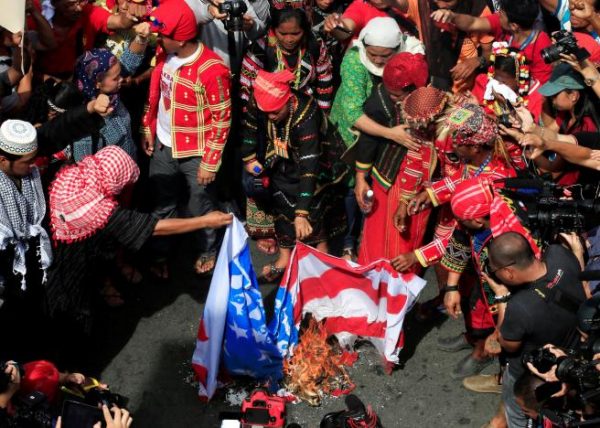
Duterte made his comments in Beijing, where he was paving the way for what he calls a new commercial alliance as relations with long-time ally Washington deteriorate.
He told Chinese and Philippine business people at a forum in the Great Hall of the People that America had “lost now”.
“I’ve realigned myself in your ideological flow and maybe I will also go to Russia to talk to Putin and tell him that there are three of us against the world – China, Philippines and Russia. It’s the only way.
“With that, in this venue, your honors, in this venue, I announce my separation from the United States. Both in military, not maybe social, but economics also.”
Duterte’s efforts to engage China, months after a tribunal in the Hague ruled that Beijing did not have historic rights to the South China Sea in a case brought by the previous administration in Manila, marks a reversal in foreign policy since the 71-year-old former mayor took office on June 30.
Trade Minister Ramon Lopez sought to explain Duterte’s comments.
“Let me clarify. The president did not talk about separation,” Lopez told CNN Philippines in Beijing.
“In terms of economic (ties), we are not stopping trade, investment with America. The president specifically mentioned his desire to strengthen further the ties with China and the ASEAN region which we have been trading with for centuries,” he said, referring to the Association of South East Asian Nations.
He said the Philippines was “breaking being too much dependent on one side”.
“But we definitely won’t stop the trade and investment activities with the West, specifically the U.S.”
Duterte’s spokesman, Ernesto Abella, said the president’s announcement was a “restatement” on his bid to chart an independent foreign policy.
Duterte wanted to “separate the nation from dependence on the U.S. and the West and rebalance economic and military relations with Asian neighbors” like China, Japan and South Korea, Abella said in statement.
Underscoring that, the Chinese and Philippines defense ministers meet in Beijing on the sidelines of Duterte’s visit, and pledged to restore security ties, China’s Defence Ministry said.
ANTI-U.S. PROTEST
Duterte’s tone toward China is in stark contrast to the language he has used against the United States, after being infuriated by U.S. criticism of his bloody war on drugs.
He has called U.S. President Barack Obama a “son of a bitch” and told him to “go to hell”. On Wednesday, about 1,000 anti-U.S. protesters gathered outside the U.S. Embassy in Manila calling for the removal of U.S. troops from a southern island.
Hundreds of left-wing demonstrators burned a replica of the U.S. flag at a rally in Manila on Friday as they called for an end to U.S. military agreements.
The United States, a former colonial power, has seen Manila as an important ally in its “rebalance” to Asia in the face of a rising China. The U.S. Embassy press attache in Manila, Molly Koscina, said Duterte’s statements were creating uncertainty.
“We’ve seen a lot of this sort of troubling rhetoric recently,” she told Reuters in an email.
“We have yet to hear from the Philippine government what Duterte’s remarks on ‘separation’ might mean, but it is creating unnecessary uncertainty.”
She also said the United States would honor alliance commitments and treaty obligations with the Philippines.
“And, of course, we expect the Philippines to do the same.”
U.S. Defense Secretary Ash Carter said Washington intended to keep to its alliance commitments to the Philippines.
“Obviously any relationship is one of mutuality and we will continue to discuss that with our Philippine counterparts,” he told reporters on a flight to Turkey.
Chinese Foreign Ministry spokeswoman Hua Chunying, asked in Beijing about Duterte’s comments, said countries should not resort to win-lose mentalities.
“We should not have Cold War thinking, it’s either you or me, you win I lose, that kind of zero-sum game,” she told a regular press briefing.
“We have always developed relations with other countries in the spirit of openness, inclusiveness, mutually win-win, not aimed at, not excluding and not affecting other countries developing normal relations with each other.”
Wrangling over territory in the South China Sea, where Brunei, Malaysia, Taiwan and Vietnam also have claims, has consumed China-Philippines relations in recent years.
China claims most of the waters through which about $5 trillion in ship-borne trade passes every year, and in 2012 it seized the disputed Scarborough Shoal and denied Philippine fishermen access to its fishing grounds.
In a statement issued by China’s Xinhua news agency, China and the Philippines said it was important to address differences in the South China Sea “without resorting to the threat or use of force”.
REUTERS

Leave a Reply
You must be logged in to post a comment.